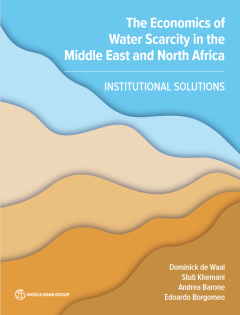
The long-standing challenge of water in the Middle East and North Africa (MENA) has become more urgent as the wide-ranging impacts of climate change unfold. With current water management strategies across MENA, a conservative estimate of water demand in 2050 points to the need for an additional 25 billion cubic meters a year. The region can no longer rely on a strategy of investing in water infrastructure to increase its supply for agriculture and cities without also making systematic institutional reforms to finance and maintain that infrastructure and regulate the demand side
This report confronts the persistence and severity of the problem of water in MENA and calls for new thinking and insights into resolving the institutional challenges faced by applying the tools of public economics -- going beyond the standard economic tools of market-based competition. It identifies promising institutional reforms to tackle the political challenges of pricing water, improving the performance of water utilities, and allocating water between agriculture and cities
The report also shows how the economics of government (the public sector) can be used to clarify what legitimacy and trust are in the context of the problem of water in MENA, and how policies can be designed to bolster legitimacy and build trust not only to tackle immediate issues in the water sector, but also for broader economic transformation.
